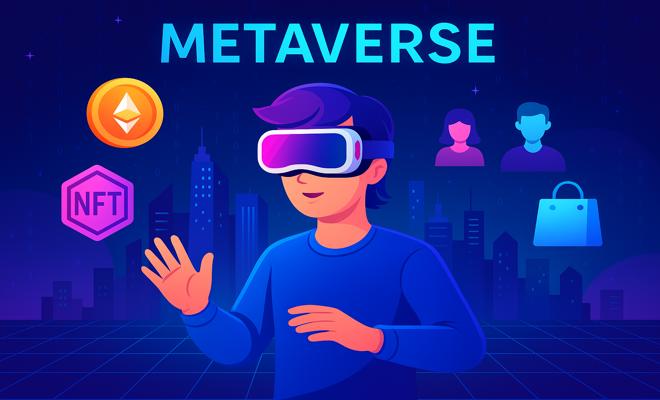
The Metaverse: Hype or the Future of Digital Reality?
📌 Introduction
In recent years, the word Metaverse has leapt from science fiction into our everyday tech vocabulary. Once a futuristic concept, it's now a multibillion-dollar frontier attracting global attention 🌍. But what is the metaverse exactly? Is it a passing trend, or a revolutionary shift in how we work, socialize, and experience the digital world? Let’s explore.
🌍 What Is the Metaverse?
The metaverse refers to a collective virtual space that combines digital environments with elements of the real world. Think of it as the next evolution of the internet—immersive, 3D, and interactive. It's not just a game or a platform; it's a persistent universe where users can live digital lives.
It integrates technologies like:
- 🥽 Virtual Reality (VR)
- 📱 Augmented Reality (AR)
- 🧍♂️🧍♀️ 3D avatars and virtual personas
- 🧾 Blockchain and NFTs for digital ownership
- 🎮👾 Social, gaming, and commerce platforms
Originally popularized in Neal Stephenson’s 1992 novel Snow Crash, the idea gained massive traction when Facebook rebranded to Meta in 2021.
💰 Economic Potential of the Metaverse
Analysts predict that the metaverse market could surpass $800 billion by 2030 🚀. Tech giants like Meta, Microsoft, Apple, and Nvidia are pouring billions into building virtual worlds, AR/VR hardware, and immersive experiences.
Examples of real-world metaverse investment include:
- 🏠 Buying virtual land on platforms like Decentraland and The Sandbox
- 👟 Brands like Nike and Gucci launching digital-only products and storefronts
- 🎤 Virtual concerts featuring artists like Ariana Grande inside games like Fortnite
👩💻 Work and 📚 Education in the Metaverse
Imagine working in a 3D office, attending global conferences from your bedroom, or studying at a fully immersive virtual university. Platforms like Microsoft Mesh and Meta’s Horizon Workrooms aim to make this a reality.
Advantages:
- 🧑🤝🧑 Enhanced collaboration and real-time engagement
- 🎓 Interactive, gamified learning environments
- 🌎 Borderless access to global opportunities
Challenges:
- 💸 High costs for VR and AR hardware
- 😓 Digital fatigue and screen time overload
- 📶 Reliance on high-speed internet and stable connectivity
👥 Social Interaction & Digital Identity
In the metaverse, users design avatars 🧍, attend virtual parties 🎉, go on digital dates 💘, or even build homes and businesses. It's a new frontier for human connection, but it also opens up complex questions about identity and rights.
Key concerns include:
- 🔐 Data ownership: Who controls your virtual persona and metadata?
- 🚫 Harassment: How do we protect users from virtual abuse?
- 🛡️ Digital property rights: Can you legally own a digital outfit or piece of land?
Blockchain technology helps secure ownership through NFTs 👗 and digital certificates, but digital ethics, moderation, and legal standards are still catching up.
⚠️ Challenges and Criticism
As thrilling as the metaverse sounds, it’s not without major hurdles.
- 💰 Accessibility: VR devices are still unaffordable for many
- 🕵️ Privacy issues: The more immersive, the more tracking involved
- ⚖️ Lack of regulation: Legal frameworks haven’t caught up
- 🧠 Mental health: Concerns about escapism, addiction, and disconnection from reality
Critics argue the metaverse is a rebranded version of platforms like Second Life or online RPGs. Without delivering real-world value, there's a risk of it being just another tech fad.
🔭 Future Outlook: What’s Next?
The metaverse is still in its infancy. But as AI 🤖, 5G 📡, and haptic feedback 🧤 technology advance, the experience will become more realistic and accessible to the masses.
Future possibilities include:
- 🛍️ Shopping in virtual malls with 3D product try-ons
- 🏥 Remote healthcare using virtual diagnostics
- 🌆 Digital tourism to historic landmarks or outer space
- 🗳️ Decentralized governance and smart cities in the metaverse
To realize this future, collaboration between developers, governments, and users is essential—along with a strong commitment to ethics and inclusivity.
✅ Conclusion
The metaverse isn’t just a buzzword—it represents a transformational shift in how we engage with the digital world 🌱. Though still evolving, it offers the promise of deeper connection, economic opportunity, and a reimagined digital life.
Whether it becomes a mainstream reality or fades into obscurity will depend on how we address its technical, social, and regulatory challenges. But one thing is clear:
The future is already being built in the metaverse 🔧🌌